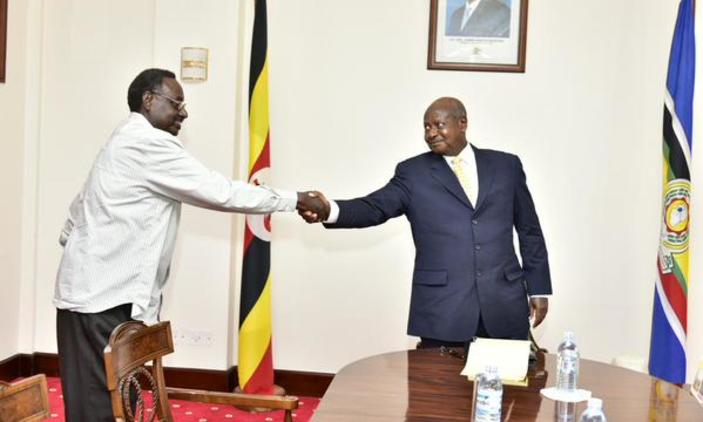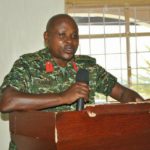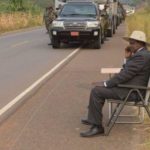For about 33 years now General David Sejusa, formerly known as Tinyefuza, and General Yoweri Museveni have been intermittent strange bedfellows, losing a lot of sleep between them.
It is said that the maverick Gen. Tinyefuza first embarked on a protracted defiance campaign against the authority of the National Resistance Army (NRA) while in the bush in the 1980s, when he challenged the Chairman of the High Command (CHC), Yoweri Museveni’s order barring officers from having wives in the bush.
According to reports, that first brush with Museveni earned the rebellious Tinyefuza a ‘not-so-short’ spell in ‘andachi’, an underground holding facility used as a prison by the NRA to discipline errant guerrillas. It is said that on the onslaught on Kampala towards the end of 1985, Tinyefuza was released and participated in the war that eventually led to the fall of the city on January 26 1986. But the General, known for his brazen talk, was still restless and defiant.
In the early 1990s, Tinyefuza, then a Brigadier, after commanding the war effort in Northern Uganda against insurgent groups like the Holy Spirit Movement (HSM) of Alice Lakwena; the Uganda Peoples Democratic Army (UPDA) of ‘Brigadiers’ Justine Odong Latek and Angello Okello and the Lords Resistance Army (LRA) of Joseph Kony, said he wanted to leave the army, after expressing dissatisfaction with the way the war effort was being coordinated.
Appearing before the Defence and Internal Affairs Committee of Parliament in 1996, Sejusa had accused the army leaders of being ‘corrupt, inefficient and lax’, and consequently penned his resignation to the Commander in Chief, Gen. Museveni. In response Museveni’s government, through then Attorney General John Patrick Amama Mbabazi assisted by the Solicitor General Peter Kabatsi, put up a spirited battle to ensure that Sejusa’s wish to leave the army would not see the light of day; a battle that went right up top the highest court, the Supreme Court, where Tinyefuza lost, consequently remaining a UPDF serving officer.
But earlier, in 1993 to be precise, then Maj. Gen. Sejusa was one of the officers alongside others like Maj. Gen. (rtd) Kahinda Otafiire, the late Col. Serwanga Lwanga and Colonel (rtd) Dr Kizza Besigye, who were opposed to the ‘partial’ restitution of kingdoms after their boss Mr Museveni rejected the idea of reviving the Ankole kingdom, arguing that the people (of the greater Ankole) had to decide if they wanted to have a cultural leader. There was also talk that the restoration would create disunity between the regal Bahinda/Bahima and Bairu in the Ankole region.
But Gen. Sejusa, himself a royal of the Bahinda clan, would hear nothing of Mr Museveni’s argument and in the company of another Muhinda senior officer, Gen. Elly Tuhirirwe Tumwine, they descended on Nkokonjeru in then Mbarara district and participated in the ‘coronation’ of then Prince John Patrick Barigye. Mr Museveni was sent in overdrive, nullifying the ‘coronation’.
Then the guns of the two most prominent Generals of the NRA/UPDF went silent for some time, and Tinyefuza concentrated on his work that saw him serve, in among others positions, Minister of State for Defence, Senior Presidential Advisor on Defence and Security, and in the latter years as Coordinator of Intelligence Services.
It was while he served in the latter office that Tinyefuza, who had not forgotten nor given up his wish to leave the army, went ballistic, penning a missive to the Director General of the Internal Security Organisation (ISO) Brig. Ronnie Balya, demanding an investigation on information that indicated that Gen Museveni was laying ground for his son Brig .Muhoozi Kainerugaba (Maj.Gen), to become President of Uganda and that the process, dubbed the ‘Muhoozi Project’ would claim the scalps of several senior military and government officials including himself, the late Gen. Robert Aronda Nyakairima and then Prime Minister Amama Mbabazi.
Gen. Museveni did not respond to the April 29 2013 missive but the subsequent events saw Gen. Tinyefuza-turned-Sejusa, flee the country for exile in London. While there, Gen. Sejusa declared rebellion against Gen. Museveni’s government, after he formed a group called the Freedom and Unity Front (FUF) in December 2013. Then Gen. Museveni fired back, telling Sejusa off: ‘if Sejusa wants to use force let him come’. But that was a lukewarm trade off between the Generals and Sejusa was to return to the country two years later, in December 2015, going straight to his country home in Sembabule, from where he insinuated that he had not given up his struggle to ‘liberate’ Uganda.
Gen. Museveni did not respond directly but instead made efforts at reconciling their now volatile relations by setting up a meeting with the renegade Sejusa, held at State House and attended by among others Gen. Elly Tumwiine.
Bu at about the same time the UPDF law seemed to say something about serving officers making political statements and Gen. Sejusa was warned by the Chief of Defence Forces (CDF) Gen. Edward Katumba Wamala. However, the Sembabule General did not respond to Gen. Wamala’s warning, and openly started hobnobbing with opposition politicians, in the process rubbing the authorities the wrong way. As a result Gen. Sejusa landed in jail in Makindye military police prison, appeared before the Court Martial chaired by late Maj. Gen. Levi Karuhanga, and was then sent to Luzira on remand. Gen. Sejusa sought bail and it was granted. However, he insisted that he was charged in the wrong court at Makindye because he had been ‘constructively retired’ from the army since all his military benefits and regalia had been withdrawn. He went to court, and last week he got the reprieve he had sought for the last 20 years after High Court Judge Lady Justice Margaret Oguli Oumo ruled that Sejusa was not a serving military officer of the UPDF.
However, the judge was not done with the UPDF/government; she reiterated that Gen Sejusa was ‘constructively retired’ from the army and ordered that he be paid Shs750 million for the agony suffered during the time he was kept in the army against his will and the law.
But it seems the Generals’ guns have not gone silent, with the Defence and Army Spokesperson Lt. Col. Paddy Ankunda, announcing the UPDF/government would appeal Lady Justice Oumo’s ruling in the Court of Appeal that is chaired by Justice Steven Kavuma.
And, given Justice Kavuma’s recent ruling in the 2015 case involving the woes of Lord Mayor Erias Lukwago and a recent one where he banned all activities related to Forum for Democratic Change’s defiance campaign, the Ugandan public now awaits the court battle between the two Generals with bated breath!








